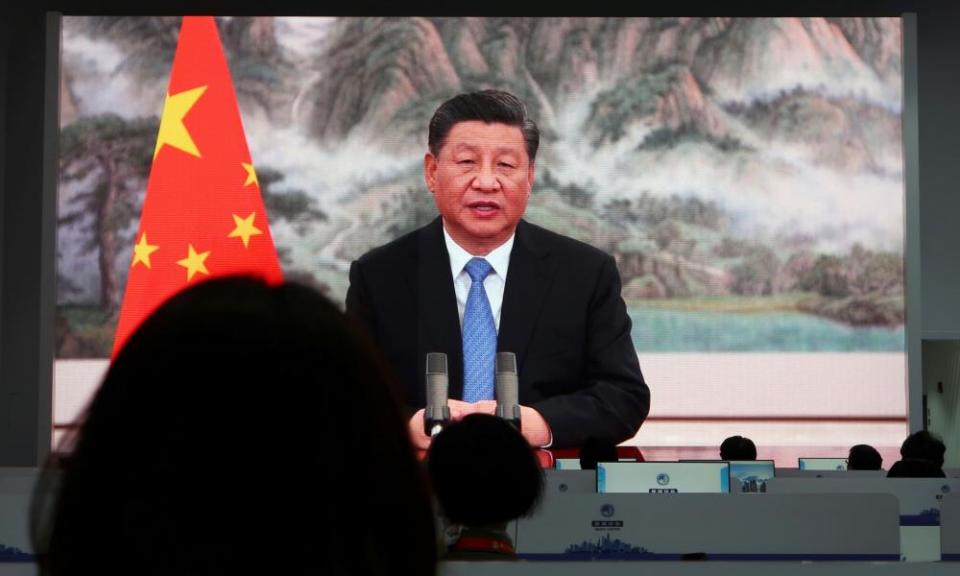Summit of political elite opens in China as Xi eyes extraordinary third term

A meeting of hundreds of members of China’s political elite, which is expected to pave the way for Xi Jinping to consolidate power with an extraordinary third term as president, has opened in Beijing.
The four-day, closed-door meeting of the ruling Chinese Communist party (CCP) central committee, known as the sixth plenum, is expected to produce a resolution on the history of the party, which analysts say will shape domestic politics and society for decades to come.
The sixth plenum is one of the last significant meetings in China’s five-year political cycle, and sets the stage for next year’s party congress, where Xi is expected to seek a third term as leader of the CCP after having previously abolished term limits in 2018.
The agenda of the meeting is top secret, with a communique of discussions and resolutions to be released after it has finished. At the 2016 plenum, the CCP bestowed the title of “core” leader on Xi, putting him on par with Mao Zedong and Deng Xiaoping but also emphasising the importance of collective leadership.
Xi opened the plenum on Monday with a work report on behalf of the political bureau of the party’s central committee and “explanations on a draft resolution on the major achievements and historical experience” of the party in its 100-year history, the state news agency Xinhua reported.
Related: Xi Jinping makes no major climate pledges in written Cop26 address
The historical resolution will be only the third since the founding of the party, following in the footsteps of Mao, who set out the aims of the party in 1945 with himself as the only true leader, and Deng, whose 1981 resolution condemned the failures of Mao’s rule while salvaging the party.
“The 1945 resolution affirmed Mao’s leadership in the CCP, and the 1981 resolution was about turning a new page from the decade-long destructive chaos of Cultural Revolution Mao created,” said Dali Yang, a China expert at the University of Chicago. “This year’s resolution will be somewhere in between – the party’s past and Xi’s future.”

Anthony Saich, a professor at Harvard University and the author of the book From Rebel to Ruler: One Hundred Years of the Chinese Communist Party, agreed. “For the CCP, history is the future,” he said. “The objective of this plenum is to tie them together to show that Xi is an inevitable product of the history of the party, which is leading China into a new chapter.”
The resolution will determine how Chinese history is taught and depicted, and dictate the context in which Xi’s authority and his policies are viewed as successes. The document comes in the centenary of the CCP’s founding and a critical time for Xi’s future leadership. Analysts say Xi hopes to cement his place in history as an epoch-making Chinese leader alongside Mao and Deng.
Related: ‘We are so divided now’: how China controls thought and speech beyond its borders
As China’s relationship with the west continues to deteriorate, many in western capitals question what type of power China is going to become in the future. In July, Xi said his party had achieved its first centenary goal of building a moderately prosperous society for all and eradicated extreme poverty. He also said “reunification” with Taiwan was a “historic mission and an unshakable commitment” of the party he leads.
Saich said that although this particular plenum was not about policy, it would, however, signify China’s newfound role on the international stage, and the party’s identity in helping the Chinese people achieve their “China dream”.
“Internationally, we will continue to see China playing an assertive role; domestically, we’ll see anti-corruption, addressing inequality and tackling environmental degradation [still] as the party’s priorities,” he said.
Critics of Xi say that since his tenure as China’s president and the CCP’s general secretary, as leader, he launched sweeping anti-corruption drives, purged many political enemies, oversaw crackdowns on minority groups, introduced his own political theory – “Xi Jinping thought” – to school students, and initiated an increasingly expansionist foreign policy.
In the run-up to this week’s meeting, Xinhua has been in propaganda overdrive, highlighting Xi’s pivotal role in many aspects of China’s achievement. “Xi Jinping often visits farms, farmers’ houses … and even inspects pigsties and toilets to obtain first-hand information of people’s livelihood,” read one tweet. “President Xi attaches great importance to cultivation of morality and ethics throughout society …” wrote another.
Reiterating the principle established by Mao Zedong that "the Party commands the gun," Xi Jinping has demanded the military be combat-ready. He also boarded China's first domestically built aircraft carrier. What else did Xi do in this regard? Read: https://t.co/cr8e45TvE8 pic.twitter.com/6JuqQFZTw7
— China Xinhua News (@XHNews) November 6, 2021
But John Delury, a historian at Yonsei University in Seoul and the co-author of Wealth and Power: China’s Long March to the Twenty-first Century, cautioned against putting too much emphasis on Xi in interpreting this week’s events.
“I fear we over-read Xi Jinping across the board and fall victim of the Chinese propaganda agencies,” Delury said. “If we use the 1981 resolution as the baseline, it was a collective effort to draw a line between the party under Deng and Mao’s Cultural Revolution. Since then, the story of the CCP-led China is one largely filled with economic growth and Beijing’s expanding role in international affairs, so the history is easier to resolve, as it were.
“Of course, since 1981 there was the 1989 Tiananmen massacre and in 2012, a massive corruption scandal involving the then Chongqing party chief, Bo Xilai, but my guess is that they are going to avoid them as much as possible, or fold them into a more triumphant narrative.”

 Yahoo News
Yahoo News 